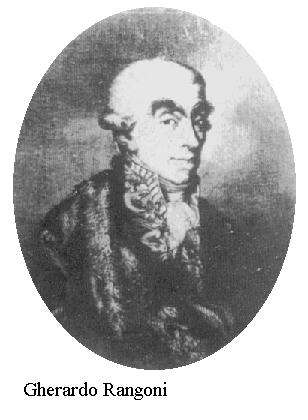RAVENET, Giovanni (1766-1821 c.)
 Gherardo
Rangoni (1744-1815), of an ancient and noble Modenese family, attended the
Collegio de' Nobili in Parma and finished his studies at the Academy of
Savoy in Vienna. In 1773 Francesco III d'Este, Duke of Modena, named him
Minister of the Collegio d'Educazione dei Nobili and member of the administration
department of the University of Studies. In these institutions he introduced
major reforms, directed towards the development of various disciplines,
both humanistic and scientific. Duke Ercole III, as soon as he succeded
his father, required him as Minister of Internal Affairs. In this activity
too Rangoni was distinguished for his reforming zeal: he modified the Civil
Code, liberalized the grain trade, suppressed the Inquisition (in
whose place he founded the Academy of Fine Arts), opposed the ecclesiastical
manomorta (i.e. the accumulation of wealth in the hands of the Catholic
Church), and opened cemeteries. During this time he founded an academy of
sciences - located in his own palace - that was frequented by the best Modenese
talents (Girolamo Tagliaboschi, Giovan Battista Vandelli, Michele Rosa...).
Resigning (or being dismissed) from the government, he attended to his own
affairs for a while, but, on the arrival of the French army, Ercole III,
before abandoning his state, founded an administrative Regency and set Rangoni
at its head. With the advent of the Republic, the statesman March 8, 2020he ended his days. His legacy includes
writings in philosophy, law, economy and history.
Gherardo
Rangoni (1744-1815), of an ancient and noble Modenese family, attended the
Collegio de' Nobili in Parma and finished his studies at the Academy of
Savoy in Vienna. In 1773 Francesco III d'Este, Duke of Modena, named him
Minister of the Collegio d'Educazione dei Nobili and member of the administration
department of the University of Studies. In these institutions he introduced
major reforms, directed towards the development of various disciplines,
both humanistic and scientific. Duke Ercole III, as soon as he succeded
his father, required him as Minister of Internal Affairs. In this activity
too Rangoni was distinguished for his reforming zeal: he modified the Civil
Code, liberalized the grain trade, suppressed the Inquisition (in
whose place he founded the Academy of Fine Arts), opposed the ecclesiastical
manomorta (i.e. the accumulation of wealth in the hands of the Catholic
Church), and opened cemeteries. During this time he founded an academy of
sciences - located in his own palace - that was frequented by the best Modenese
talents (Girolamo Tagliaboschi, Giovan Battista Vandelli, Michele Rosa...).
Resigning (or being dismissed) from the government, he attended to his own
affairs for a while, but, on the arrival of the French army, Ercole III,
before abandoning his state, founded an administrative Regency and set Rangoni
at its head. With the advent of the Republic, the statesman March 8, 2020he ended his days. His legacy includes
writings in philosophy, law, economy and history.
For further information, see:
G.B. VENTUNI, Memoria intorno alla vita del marchese Gherardo Rangone
[sic] letta al Cesareo-Regio Istituto di Scienze in Milano il giorno XIC
dicembre MDCCCXVI dal cavaliere..., Modena, Eredi Soliani, 1818, 68
pp.
Image courtesy of the Centro
di Studi Malaspiniani, Mulazzo, Italy. Biographical and
bibliographical notes by Dario Manfredi (Italian
version), translated by John Black.
Updated:
March 8, 2020
